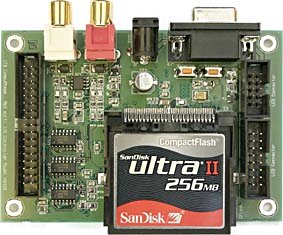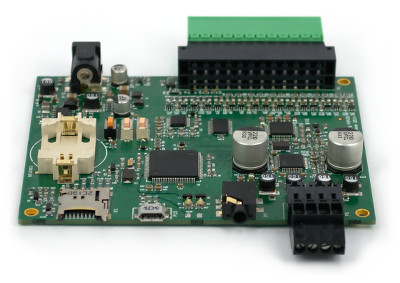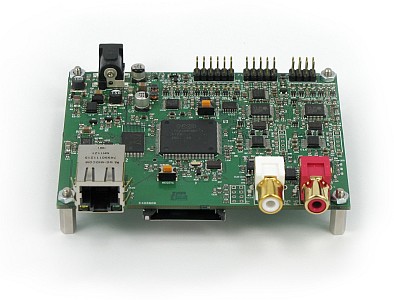Programmable Audio Players

We offer several high-quality audio players. All players have interfaces to external devices, (vandal-resistant) switches, remote controls, sensors and actuators. In combination with their industrial temperature range and their solid-state design, this makes the audio players suitable for exhibition centres, scale models, game consoles and kiosk applications.
The audio players are programmable by the end user (or site owner) through a scripting language. As a result, the audio player can fit into almost any design for which you need high-quality audio.
Model H0420
Model H0420 supports only MP3 tracks (all bitrates) and uses a CompactFlash card. It has RCA connectors for line-level audio output. Peripherals are:
- 16 input pins (with bounce filter), for switches or switch contacts
- 16 general purpose digital I/O pins, one analogue output pin
- RS232
- via an extension connector and an extension board, the H0420 can be connected to a network
Model H0430 (Starling series)
Model H0430 supports MP3, uncompressed WAVE and Ogg Vorbis. It uses a micro-SD card for storage. The H0430 has an I/O connector that allows for flexible wiring without requiring tools. A 2 × 15 Watt class D amplifier allows direct connection to passive speakers. Alternatively, a 3.5 mm TRS jack provides a headphone/line-out signal. Peripherals are:
- USB interface
- 16 general purpose digital I/O pins, one analogue output pin
- dual RS232
- SPI
- temperature sensor
- real-time clock
Model H0440 (Starling series)
Model H0440 supports MP3, uncompressed WAVE and Ogg Vorbis. It uses an SD/MMC card for storage. The H0440 has a dual audio decoder and can play two tracks simultaneously. The audio for both decoders is available on a pin header for each decoder separately, or mixed on the RCA connectors (line-level audio output). Peripherals are:
- network (100 Mbit/s, with auto-negotiation)
- 8 general purpose digital I/O pins, one analogue output pin
- dual RS232
- SPI, with double "slave select" pins
- temperature sensor
- real-time clock
- Programming the MP3 controller/player: getting started
- 2011-08-01
This article steps through the creation of a very simple program, from the installation and configuration of the tools to the evaluation of the result. It refers to model H0420, but most concepts also apply to the Starling players. - Playing tracks sequentially
- 2008-09-22
A sequel to the above tutorial, in which we develop a script that plays MP3 tracks one after another (and in a random order).
Most recent update: This update of the article makes switching from one track to the next track even faster, by creating "resource ids". The discussion on track separation has been moved, with many enhancements, to a separate application note. - Track and artist separation
- 2012-05-15
When selecting the tracks to play at random, you will often want a form of track separation or, better yet, artist separation, so that the same track (or one of the same artist) does not play too quickly again. This article discusses how to implement track separation and artist separation. - Synchronizing activities with music
- 2018-03-05
An ID3 tag in an MP3 track may optionally contain text or commands with time stamps. These time stamps allow the text or the commands to be synchronized with the music. The H0420 MP3 controller supports this extension, and the article gives a complete example implementation. - Gapless looping MP3 tracks
- 2020-11-05
Due to the file format and the algorithm of MP3 tracks, creating a loop without a gap or click is a little involved, especially when using a hardware player. The H0420 MP3 controller and the Starling audio controller can play gapless MP3 audio loops, provided that special software has processed the MP3 track.
Example tracks & processing software are available from this site, as well as a detailed presentation of how it works.
Most recent update: The software was improved with better interpolation in the resampling phase, a GUI "wrapper" utility was added for ease of use. - A remote-controlled MP3 player
- 2018-03-05
Adding functionality to manipulate the H0420 MP3 controller with a common remote control only takes the IR-receiver chip and a pull-up resistor, plus a script that interprets the codes sent by the remote control. This article goes into details and provides a general purpose script for RC5 codes (other infrared protocols are supported by modifying the script). - Connecting a bar-code wand to the MP3 controller/player
- 2011-08-01
The H0420 MP3 controller supports a low-cost bar-code wand directly on its I/O pins (only a pull-up resistors sometimes needs to be added). This article descibes the connections and presents a script that decodes the "interleaved 2 of 5" bar-code symbology. - Synchronizing time with DCF77
- 2018-03-05
This article describes how to synchronize the internal real-time clock of the H0420 MP3 controller on the time signal emitted by the atom clock on the DCF77 transmitter.
Most recent update: The article also discusses the MSF60 transmitter (in Great Britain) and protocol. - Encrypted MP3 tracks
- 2018-03-05
The H0420 MP3 controller and the H0440 audio player/controller are able to play encrypted MP3 tracks directly (without needing an intermediate decryption phase, and so without start-up delay). This article discusses the software and the operations necessary to create MP3 tracks with strong encryption (and how to play them back). - A MIDI to RS232 converter
- 2024-11-25
The MIDI protocol is a serial data communications protocol using on a "current loop" physical layer, and using a Baud rate of 31250 bps. This article shows the electronics needed to convert between current loop and the RS232 signal levels. The circuit can be connected directly to the RS232 port of the H0420 MP3 player. In the second part, the article covers the "software protocol" of MIDI and develops a simple script to send and receive MIDI commands. - Power-outputs for the programmable audio controller/player
- 2013-02-11
Both the programmable MP3 player model H0420 and the Starling audio player have digital I/O pins with TTL-level output. This note describes how you can get more power (and/or a higher output voltage) from the I/O pins. - LED current source
- 2012-05-15
Both the programmable MP3 player and the Starling audio player have digital I/O pins with TTL-level output, which can directly drive a single LED. This note describes a constant current source that you can use to drive more than one LED, at an equal brightness, controlled from just one I/O pin. - A voltage inverter circuit
- 2010-04-15
The programmable MP3 player model H0420 directly supports LCDs with a HD44780 controller and a positive LC-driving voltage. With the voltage inverter described here, you can also attach LCDs that need a negative LC-driving voltage. - H0420 Internals
- 2018-03-05
The internals of the H0420 are briefly touched upon in this on-line article. The notes cover both the hardware and the software ("firmware"). - Interfacing the VS1053 and VS1063 to DACs and SRCs
- 2024-11-24
The VS1053 and VS1063 audio decoder chips from VLSI Solutions support I2S output (in addition to analogue audio output). However, the specific I2S format narrows your choice of DAC, SRC or DSP. The simple circuit presented in this application note converts the I2S format from the VS10x3 to 32Fs Right-Justified, which has much wider support by DAC, SRC and DSP chips. - The STA013 MP3 decoder
- 2024-11-24
This paper is a collection of hardware notes on the use of the STA013 MP3 decoder from STMicroelectronics. The paper also contains some notes on the MP3 file format.



